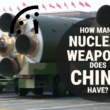Deterrence coexisting with disarmament
By Polina Sinovets, June 30, 2014
In her third roundtable essay, my colleague Salma Malik expressed her hope that "as more women gain influence over nuclear weapons policy, the world will learn to 'forget' nuclear weapons entirely." For Malik, "forgetting" nuclear weapons means achieving complete disarmament. But there is another sense in which "forgetting" nuclear weapons is exactly the wrong thing to do.
When I was seven years old, my teacher told my class about nuclear weapons. She said that the United States had created a very efficient nuclear bomb and planned to use it the next day—against the Soviet Union and therefore against my classmates and me. "But don't worry," the teacher said. "The Soviet Union has the same kind of weapon, and will use it at the same moment the Americans do. So the whole world will be destroyed."
Thus my first encounter with the concept of nuclear weapons led me to believe that the world would die the next day. Even now, thinking of nuclear weapons provokes the same fear that I felt then. My teacher may have been wrong to frighten a group of impressionable children so badly, but I nonetheless believe that the correct response to nuclear weapons is deep-seated fear.
I also believe that nuclear weapons—to the extent that they prevent warfare by inspiring profound terror—make a great contribution to mankind.
In 1988, Margaret Thatcher and Gennady Gerasimov, a spokesman for the Soviet foreign ministry, engaged in a televised exchange of views regarding nuclear weapons. Gerasimov said, in reference to Thatcher’s skepticism about disarmament in Europe, ''You do not believe in a nuclear-free world. So our task is to convert you to our faith.'' Thatcher, speaking a few hours later on a different program, replied, “I want a war-free Europe. A nuclear-free Europe, I do not believe, would be a war-free Europe. … The nuclear weapon has kept the peace in Western Europe for 40 years.''
More than 25 years have passed since this exchange, but I believe now, as Thatcher did then, that nuclear weapons prevent mankind from destroying itself in world war. That said, nuclear deterrence is a very delicate thing—and it is destined to collapse, with deadly consequences, if responsibility for its maintenance is left solely to the men whom Carol Cohn described in "Sex and Death in the Rational World of Defense Intellectuals." Indeed, deterrence must be approached with an appreciation for, in Cohn's words, the "emotional fallout" of nuclear war. It must take into account the "feminine" approach of women such as the Acronym Institute's Rebecca Johnson, who continually reminds the world of the fatal consequences that nuclear detonations would entail. She puts nuclear war in human terms—reporting, for example, that if the warheads in just one of Britain's Trident submarines were fired on Moscow, 5.4 million people could be expected to die within a few months. Johnson works to ensure that nuclear weapons produce terror in the public—the same terror that I felt as a girl. As for "white men in ties discussing missile size," as Cohn described them? They must feel this terror too and share in responsibility for it.
The function of nuclear deterrence is preventing big wars. That function can be fulfilled indefinitely if deterrence is approached with a feminine sensitivity to nuclear war's costs—and if, at the same time, nuclear arsenals are significantly reduced. Fear must never be forgotten.
Topics: Nuclear Weapons
Share: [addthis tool="addthis_inline_share_toolbox"]














